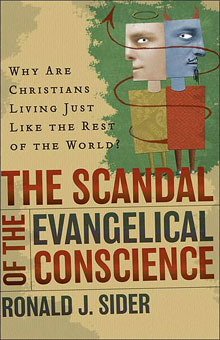Evangelical activist for social justice Ron Sider wrote his book The Scandal of the Evangelical Conscience: Why Are Christians Living Just Like the Rest of the World? a couple of years ago. In the July/August issue of Books & Culture: A Christian Review John G. Stackhouse, Professor of Theology and Culture at Regent College in Vancouver, takes Sider to task for his book’s shortcomings, but ends his critique with some challenging words of interest to educators in the church.

Sider’s central thesis is clear enough, Stackhouse writes: “American evangelicals fail so badly to live according to the gospel that we are, in many respects, indistinguishable from the world around us.†However, he adds, Sider is neither not clear nor consistent in defining what an evangelical is, and he is guilty of “terminological imperialism†by speaking of the failings of evangelicals one moment, and the failings of Christians the next, as if all true Christians were evangelicals. Moreover, Sider relies heavily on polling done by Barna and Gallop to reveal a phenomenon that he calls a “crisis of disobedience†but Stackhouse suggests that what he is really asking is if authentic Christian faith makes a verifiable difference in the world and, Barna and Gallop aside, he concludes that “there seems to be abundant evidence that it does.†Also verifiable, says Stackhouse, is that evangelicalism has had its ups and downs in this country from the Great Awakening forward, it has shaped American institutions throughout our history, and Sider himself acknowledges that when careful distinctions are made between nominal Christians and deeply committed ones, this is found to be true. In the end, when pollsters narrow their scope and ask the right questions, evangelicals look a lot better.
What Sider and the pollsters actually uncovered, according to Stackhouse, seems to me to be of great importance for educators. Evangelicals, he says, are victims of their own success in this country and, as a result, share the problem faced by every religious movement throughout history – – the second generation. Stackhouse acknowledges Sider is both prophet and scholar, and his quarrels are with the scholar, not the prophet. The scholar should have known better on some of the polling results, and his case would be the stronger for it, but all Christians would be the wiser for listening to the prophetic voice and, as Stackhouse suggests, “face ‘the second generation’ problem now. To do so, he says, would be to take the Christian education of children seriously again, strengthening families by strengthening parenting skills, providing excellent Sunday School and youth groups.
Don’t stop with the children, he adds, noting that “adult Christian education is a travesty in too many churches.†Adults need to be educated “particularly in biblical standards of holiness and how to both apply and attain them,†making their education “simply crucial to helping adults cope well with the temptations of our times.†I hear Stackhouse’s review as a ringing call to congregations of all theological stripes to get our priorities straight. Elevate positions like Sunday School Superintendent, Youth Pastor, and Pastor/Minister of Christian Education to the level of Worship Leader, Music Director, or —dare I even suggest it—Pastor? Then maybe we’ll be onto something meaningful that will contribute to the building up of the Body of Christ—maybe even bringing the reign of God a little closer to this cynical and conflicted earth. What do you think?


1 Response to Second Generation